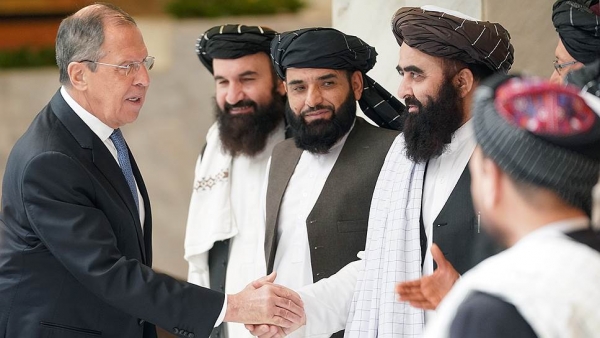
by Asia Maqsood 10 November 2022
The largest obstacle to the legitimacy of the Taliban government is their unfavorable policies, which have caused Afghanistan under Taliban rule to face enormous obstacles since the US withdrew.
It must change its policies in order to get political recognition. To do this, the Taliban-led Afghanistan must be aided by the international community, with oversight that the aid is distributed to the Afghan people.
Russia will hold a multilateral talk on Afghanistan on November 16, 2022. At the meeting, Moscow format of discussions on Afghanistan, special envoys from China, India, Pakistan, Kazakhstan, Iran, Kyrgyzstan, Tajikistan, Turkmenistan, and Uzbekistan are expected to attend. At a news conference in Moscow, Foreign Ministry spokesperson Maria Zakharova said, “The conversation will center on the military-political, socioeconomic, and humanitarian situation in Afghanistan as well as coordinating measures to bolster regional security.” These consultations will aid in laying the groundwork for strategies to help Afghanistan overcome its current crises.
If we look upon Afghanistan’s political situation, foreign nations have not legally acknowledged the Taliban, arguing that if they want international recognition for their authority, they must relax restrictions on women.
The United Nations reported that Taliban forces were responsible for nearly 40 percent of civilian deaths and injuries in the first six months of 2021, although many incidents were unclaimed. Women and children comprised nearly half of all civilian casualties. Attacks by the ISKP included assassinations and a number of deadly bombings.
Economically, Afghanistan is expected to develop at a modest rate (2.0 to 2.4 percent), with no improvement in per capita incomes due to rapid population growth and no appreciable change in the forecast for poverty or food insecurity.
As far as its security situation is concerned, its bordering countries have serious concerns over Taliban rule in Afghanistan; Such as China’s top priority is prevent the possible spread of militancy into its borders, with a particular emphasis on Uighur fighters.
For Pakistan, where levels of militant violence in the tribal areas along the Afghan border have already increased since the Taliban’s takeover of Afghanistan, is the revival of the TTP. However, Russia, Iran, and the Central Asian states are chiefly concerned with stopping IS-KP from growing stronger and are also worried about other foreign militant groups, some of which, like the Uighur fighters, are allied with the Taliban. India is also engaging with Taliban.
Transnational extremist groups, who appear to be quite safe in Afghanistan since the Taliban assumed power, continue to worry Western governments greatly.
So, political, economic and security stability of Afghanistan is concern of all regional and extra regional states with their respective concerns. So, it is yet to be seen that how much all these states; China, India, and Pakistan align their interests. Otherwise, the struggle for the influence in Afghanistan would continue, rather than the country’s rehabilitation and security stability.
One of Russia’s concerns is that Tajikistan, one of Russia’s partners in the region, has a military base of Russia. Tajik forces frequently engage Afghan drug smugglers along Tajikistan’s 1,200-kilometer border with Afghanistan. Some analysts are concerned that Tajikistan, the poorest of the former Soviet governments, could become unstable as a result of the Taliban’s re-taking control in Afghanistan last August.
The worst challenge which Taliban led Afghanistan is facing is on humanitarian grounds. There are 24.4 million people will be in humanitarian need in 2022 which is more than half the country’s population. Moreover, Since the Taliban took, Afghan women are expected to hide their faces in public and stay away from long road excursions unless a male relative is with them, according to the country’s leadership. Teenage girls are prohibited from attending secondary schools from grade seven through twelve, and the majority of female public sector employees have been instructed to stay at home. Since the Taliban need to relax restrictions on women if they want international recognition for their authority, foreign nations have not yet formally recognized them. On November 10, Taliban has prohibited women from using gyms in Afghanistan, the latest edict the hard-line Taliban have issued since seizing power more than a year ago to restrict women’s rights and freedoms. The Taliban reject criticism of their administration, arguing that it adheres to Islamic law and Afghan culture. What would result from the upcoming Russia consultation on November 16 remains to be seen. Actually, the Moscow consultative format was launched in 2016 in an effort to encourage political reconciliation between the Taliban and the then-internationally supported Kabul government.
